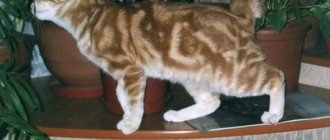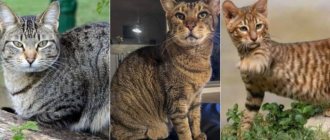Peculiarities of behavior, character and disposition of the British
The plush appearance of British cats, which sets them apart from other cats, is very deceptive. There is a complex personality hidden within. She knows her own worth and has her own opinion. As a rule, mestizos, or half-British people, have the same qualities.
For your information. A purebred British cat is exceptionally straight-eared. The misconception that the breed is fold-eared arose due to confusion with the Scots.
The character of British cats is characterized by independence. They are not as social as other breeds, and this is something you should be aware of before getting a kitten.
They say the British are evil. This is partly true. The animal allows itself to be loved from afar, and graciously accepts affection if it is in the right mood. Otherwise, it is better not to touch it. A British cat will not make a pet that will look at its owner with adoration and impose itself.
Outwardly they are very cold and, in English, restrained in their emotions.
A British cat will not:
- meow loudly to get attention or food;
- ask to be held;
- constantly rub against the owner's legs, showing devotion.
The British are great for people who are often away from home. These cats do not suffer from loneliness and know how to entertain themselves. However, deep down they love their owner very much.
British cats need attention and are very upset if another “pet” appears in the house. This could be a new pet or a child. If you ignore your pet, he will begin to “mope.”
The behavior of British cats is the embodiment of aristocracy and self-sufficiency. Representatives of the breed always behave in an emphatically polite manner. They don't get angry or show any displeasure when strangers come, even if they don't really like the guests.
A British cat will watch a stranger for a long time and sniff his things. Her trust can only be earned over time.
For your information. Both short-haired and long-haired British cats have almost the same character. All of them are characterized by independence and equanimity.
The British are the masters of the house. It is advisable to provide them with access to all rooms so that the cats can regularly walk around their “possessions”. If your pet cannot get into the room, he begins to get nervous.
British cats are very sensitive to the emotional situation in the family. Where quarrels and scandals constantly occur, the behavior and condition of the animal changes for the worse. For example, to express protest, a Briton may go to the toilet past the tray.
Also, British cats do not have high stress resistance. They find it difficult to travel, sudden changes in surroundings, and the constant presence of strangers. Because of this, pets become even more withdrawn.
In good conditions, British cats become patient and non-aggressive. They take part in children's games, are lenient towards pranks and calmly endure all pranks. The British woman would rather just walk away than scratch or bite.
Representatives of the breed do not come into conflict with other pets. There are known cases of friendship not only with dogs or cats, but also with hamsters and even parrots.
Important. Each cat, like a person, has individual character traits. Your pet's temperament may differ slightly from the description given.
One of the not-so-pleasant characteristics of the breed is stubbornness. The British cat will not do anything unless she wants to. There is no point in forcing her. The pet will only get angry and stop communicating.
The British remember grievances for years. The owner may have already forgotten about the quarrel, but the cat will try to find the right moment to take revenge. Therefore, it is better to solve problems that arise with affection.
Grudges are more common in cats than in cats. But boys become more attached to all family members.
Girls are somewhat more sociable and kinder. However, of all the “roommates”, she chooses only those who pay her more attention and care. During pregnancy, British women themselves turn to the owner for another portion of affection, looking for participation and sympathy.
British cats make good mothers. They carefully care for their offspring, leaving the “nest” only when absolutely necessary. Some cats, especially after their first birth, do not understand what is required of them. In this case, the owner needs to intervene and encourage the pet when she licks and feeds the kittens. It is strictly forbidden to shout at an animal.
Difference between British Shorthair and Longhair
The British, like girls, are different. And their character depends on the variety.
A breed such as the British Shorthair cat has a very specific and ambiguous character. Depending on your mood, circumstances, your behavior and amount of attention, your pet may behave differently. If you anger an animal, this does not mean that you will be bitten right now. However, he has a good memory. And they will be offended by the owner for a long time. Therefore, it is important not to forget the main rule - the key to the heart of a British Shorthair is love and affection.
But the British Longhair cat has a much more flexible character than one with short hair. They are like heaven and earth. The long-haired British cat gets along with people and dogs in the house, will not try to eat your hamster or parrot, and will be friendly with you.
British habits
The British quickly get used to relieving themselves in a litter box and following the rules of living together. Kittens adopt basic habits from their mother. Therefore, it is important that she is also well brought up.
British cats are fans of cleanliness. The owner will have to ensure that there is always fresh filler in the tray. Otherwise, these aristocrats would prefer to go to the toilet on the owner’s bed. In the same way they express dissatisfaction with any reason. Representatives of the breed also do not like sudden changes in the type of filler.
British cats are also picky eaters. They often refuse food, waiting to be given their favorite treat.
The British devote a lot of time to grooming their fur. They can groom themselves for hours to get their coat looking perfect. This is a way for cats to relieve stress at the same time. Monotonous actions help them calm down and relax.
If the owner picks up the pet after it has been “washed,” the Briton will begin to lick itself again, eliminating hand odor. This feature must be taken into account so as not to cause inconvenience to the animal.
For your information. To prevent fur from accumulating in the stomach, British cats are periodically given malt paste. It gently cleanses the gastrointestinal tract without causing discomfort.
The majority of British cats behave very quietly. Pets rarely meow - more or less loud sounds can only be heard during the mating season. However, there are quite talkative British people who like to “talk” with the owner.
Many British cats make excellent hunters. After all, once upon a time the British bred them not for beauty, but to exterminate rodents. Not only mice, but also birds, lizards, moles and frogs can become prey. If there is nothing “under your paw”, flies or beetles will do.
After a successful hunt, a British cat will definitely come running to its owner to show off its trophy. But his pet will not eat. For him, the process is important, not the result.
It happens that a Briton does not pay any attention to game. Most likely, he is tired or in an inappropriate mood.
Aggressive cat: what to do and where to run
Cats are very sensitive creatures with a subtle psychology, so their behavior is significantly influenced by external factors, especially strong emotions such as fear.
A cat that is afraid of something takes a characteristic pose - it presses its ears tightly to its head and moves them back, presses its head and body to the ground, tries to become more invisible, in many cases the animal simply tries to run away.
If it doesn’t run away, it tries to defend itself. A cat that is ready to defend itself looks like this - it raises its paws and swings them, makes sounds similar to spitting, hisses, its fur stands on end (especially on the tail, head and back), its back arches and the animal moves sideways forward, so a cat tries to show its superiority (including in size) and intimidate the enemy.
In most cases, fear is the main cause of aggression in cats. If your pet is timid, you should never deliberately provoke fear; you should also ask your friends and acquaintances to approach the animal slowly, not abruptly, and say kind words as they do so. Only in this way can possible aggression on his part be neutralized.
If the cat is ready to attack, is aggressive, you can spray water on it from a spray bottle, this will cool its ardor. If an animal scratches a smooth surface out of despair, it means that it has lost control of the situation. In this case, you need to put some kind of rug on the cat so that she can sharpen her claws on it, or wrap her in a warm cloth - this way the cat will calm down faster.
Another reason for cat aggression is defense of territory. If there are several animals living in your home, especially if you are the owner of several cats that have reached sexual maturity, they may begin to fight for leadership. To prevent this from happening, introduce the cats correctly in the first days.
The animal that lived with you before should definitely receive more attention - this way it will not feel threatened and will not become jealous. As a rule, cats that live together eat from the same bowls and use the same litter box, but this can cause aggression. Cat utensils should be separated as soon as you notice that the animals are demonstratively avoiding the litter box or fighting around the bowls.
Different smells of animals can cause them to fight, so the manifestation of aggression of one pet towards another can be reduced by bathing them with the same shampoo or spraying them with the same cologne.
Neutered cats, as a rule, are less aggressive, and even sworn enemies can be reconciled. But it is better to castrate animals between the ages of seven months and 1 year, until they acquire the habit of showing aggression and marking territory.
Often those who keep cats confuse their bites with aggression. Small kittens may bite you because their jaws itch (due to teething). Invite them to chew bones, but only those that they cannot chew, or large pieces of meat. Never feed bones from small animals and birds, or chicken bones, as kittens can chew them, causing damage to the gastrointestinal tract.
Often, when the owner tries to pet his pet, he may begin to bite, especially if you want to scratch the cat’s tummy (the stomach for cats is the most vulnerable place, if the animal allows you to scratch its tummy, it means it is subordinate to you and completely trusts you). However, this does not always mean that the cat is aggressive; most likely, your pet is simply not in the mood for communication at the moment or she does not like your affection.
Under no circumstances should you hit cats that show aggression - this will only make the situation worse. If possible, you need to eliminate the cause of the aggression and cool the animal’s ardor with a stream of water.
The following method may also help. You've probably seen how cats behave during fights (swinging their paws at each other, hissing) or mother cats with their children (ruffling them and holding them by the withers). You must do the same - lightly shake the animal by the scruff of the neck, lightly tap it on the nose with your finger, imitate the waving of cats' paws during a fight, hiss at it menacingly and be sure to look the cat in the eyes, since the one who looks away first will “lose” - These are the cat “rules”. You must ensure that your pet looks away, he will become somewhat confused, begin to hesitate, may begin to leave or lick himself - this all means that the animal has recognized you as the leader.
Did you like the article? Click the button and share with your friends! Let there be more happy people and cats!
A little about activity
Until a year old, Britons are not much different from other cats. They are active and mobile, and do not refuse to play. Natural curiosity makes them look into all hard-to-reach places, for example, climb onto cabinets.
Kittens love to play hide and seek, suddenly jump out at their owner, imitating an attack, hunt for toy mice or run after balls. If the baby is tired, he pretends to be asleep so as not to be disturbed for a while.
For your information. To prevent the kitten from acting up, it is worth buying him a special play area where he can hunt and splash out the accumulated energy.
As cats age, they become calmer. They are not averse to running after an impromptu mouse, but most of the time they prefer to rest and watch what is happening.
This has its advantages. An adult British cat will not climb on tables, overturn flower pots, tear off curtains or damage furniture. But the owner must ensure that the pet does not gain weight due to low activity.
The British sleep up to 20 hours a day. Moreover, for this they choose the most secluded corners:
- top shelves of cabinets;
- open boxes or suitcases;
- ovens and washing machine drums;
- places under a bed or chair.
To keep your pet safe, before turning on the washing machine or oven, it is advisable to check if your beloved cat is there.
Scottish fold cat
The Scottish Fold cat with soft and dense hair of short or medium length has appealed to modern people. Scottish cats are very good-natured and have a confident and calm character. They are attached to their owners and love the company of people. They get along well with other animals and are partial to children. Kittens are born with straight ears; only after 4-5 weeks do their ears begin to lie down or remain straight. These cats were first documented in 1796; their homeland is Scotland.
The most popular cat breed No. 7. Scottish fold cat
Bad habits
The breed is distinguished by aristocratic manners, but even it is characterized by some bad habits:
- Kittens can bite during the period when baby teeth are replaced by permanent ones (from 4 to 6-7 months). To prevent this from becoming a habit, the baby is immediately offered to sharpen his teeth with the help of toys, and not the owner’s hands.
- Many British cats love to knock various objects off shelves and chase them across the floor. Therefore, it is better to put figurines, pens, tubes of creams, vases and other things away, and treat the favorite place with a repellent spray. The drug can be purchased at a pet store or veterinary pharmacy.
- The British are inquisitive - they will not refuse to check a bag, reach into a package or rummage through things. If the owner does not like these habits, it is better to put all the “interesting things” out of reach.
Bad habits often arise from boredom or lack of attention. If the cause is eliminated, the British cat will quickly get rid of them.
Tender and affectionate British chinchilla
The British Chinchilla is a variety of the British breed that was created by crossing the British and Persian breeds. Usually this breed is chosen by those who are captivated by the beauty of the British, but are confused by their rebellious nature.
Representatives of this breed love to cuddle and play with their owner; they will be able to establish relationships with all family members, even children, as well as animals. It is these character traits and qualities that make chinchillas a favorite.
British cats are distinguished by aristocracy and arrogance, independence and touchiness; they rarely show their feelings, so they can rarely be seen in an aggressive state or affectionate towards their owner. When getting a cat of this breed, you need to remember that it will always consider itself equal to a person.
Rules of education
British cats have been raised since early childhood. This breed is quite stubborn and conservative. It will be very difficult to retrain her as an adult.
After a kitten appears in the house, you must:
- introduce him to the new home and all its inhabitants;
- show where the tray, places for eating and sleeping are located;
- gradually accustom to hygiene procedures;
- bring your pet to the scratching post so that he doesn’t start spoiling things.
Immediately set restrictions. For example, if a person does not want an adult Briton to sleep on the master's bed, the same should not be allowed for a kitten. All family members must comply with the prohibitions, otherwise no result should be expected.
If a Briton makes mistakes, there is no need to shout at him, much less hit him. It is enough to say in a firm voice “No!” and lightly scold with the words “bad”, “naughty”, etc. Soon the kitten will understand what his mistake was and will try not to make it again.
While the British cat is learning good manners, it is better to remove all “temptations”:
- move the furniture so that it covers the wallpaper;
- raise the curtains on which the kitten can swing;
- treat with a special spray the places where the Briton gets used to going to the toilet (except for the litter tray);
- remove indoor flowers from reach, lubricate the leaves with lemon juice or another non-toxic substance.
For your information. If your kitten constantly eats flowers, you should contact your veterinarian. Perhaps your pet lacks vitamins and minerals.
The scratching post is installed in an accessible place. The kitten is brought to her every time he tries to tear up the furniture. For correct actions, the British are rewarded with sincere praise and their favorite treat.
If you show patience and perseverance, the kitten will grow into a well-mannered pet with noble manners.
Attitude towards children and education
Usually English families have two or three children. They are very kind to children, even overprotective of them. For example, Mark has two daughters from his first marriage. When we got married, they were 12 years old. One day, for the first time, I was left alone at home with them, I was cooking and remembered that I needed to buy more groceries. The girls stopped me at the door and explained that I should not leave them alone. If at this moment the postman, a neighbor comes, or someone sees that the children are alone at home, this is fraught with deprivation of parental rights. If both parents work, the children are left with nannies and grandmothers, but most often the children remain at school - they study in different sections. At the same time, in the UK, parents insist that children who have reached adulthood live separately. When Mark's daughters turned 18, they moved out.
The entire infrastructure in the country - pedestrian crossings, ramps and ramps - is equipped for people with children. Nothing is forbidden to children, it is not customary to make comments to other people's children - parents can cause a scandal about this. One day, before my eyes, a child fell and broke his knees. He lay there crying, but no one came to him. When I ran up and started to pick him up, my husband literally pulled me away from the boy, saying that I could be accused of sexual harassment for touching someone else’s child, especially of the opposite sex. For me, such an attitude was savagery. Fortunately, his mother soon approached the boy.
Many children love going to school - I can judge from Mark’s daughters, who attended lessons with enthusiasm. Teachers give non-standard tasks that captivate children, for example, I once helped the girls decorate a model of the earth. Children freely express their opinions, parents and teachers support this and try to actively develop the personality in each child. There is a widespread belief among English teenagers that higher education is useless—you can earn money without it. Young people work as salesmen in stores, waiters in cafes and restaurants. At the same time, in England it is customary to be proud of a higher education or degree - the British like to indicate their level of education on business cards.
Strengths and weaknesses of character
British cats behave like real Englishmen. Cold and prim in appearance, they become strongly attached to their owner and love him with all their hearts. The main thing is to find an approach to such a pet.
The main pros and cons of the British cat breed are presented in the table.
| pros | Minuses |
| Devotion | Waywardness |
| Cleanliness | Independence |
| Patience | Touchiness |
| Silence | Vindictiveness |
| Good attitude towards children and other animals | Picky eating |
| Sensitivity to the owner's mood | |
| Lack of aggression |
British cats have a difficult character. But if you treat them with affection and love, they will definitely return the favor.
Psychology of British cats
The character of British cats is very multifaceted and depends on certain factors, but their psychology is simple. Mood greatly influences your pet's behavior. The owner's attitude can change the animal's mood, so it is important that the pet never feels lonely and abandoned.
If a Briton is sad, it is simply necessary to devote more time to the animal, for example, with games. Never get angry with your pet. British cats hold grudges for a long time. Oddly enough, the characteristics of the breed influence the nature. Thus, long-haired representatives are more friendly and never hide their love.
Minuses
Negative points of the British cat breed:
- The British require proper, balanced nutrition ; the bulk of their diet consists of beef or poultry. Therefore, it is advisable for such cats to prepare food from natural products.
- This breed does not need fish in any form, neither fresh nor food containing it.
- Despite all the cleanliness of cats, they require, like all purebred cats, nail trimming, ear cleaning, eye care (washing), regular examination, pad cleaning, as well as all preventive vaccinations in accordance with age.
- If you use a combination diet for a British dog or completely artificial food, you should not overfeed your pet and monitor its weight, because they have a good appetite and are prone to obesity.
- By nature, the British are very independent and willful , so immediately give up trying to train cats of this breed, and just limit yourself to instilling the rules of hygiene (tray, cleaning and care).
- The British cat, with all its friendliness, will limit the boundaries of what is permitted - perhaps it will allow itself to be stroked, but it will not always accept being picked up.
- If you are allergic to cats , you will have to give up the desire to keep a British cat at home, as well as any other breed of domestic cat.
Health and life expectancy
The British cat lives 13–15 years. Short-haired representatives of the breed are in good health, but some inherited diseases still occur in them:
- Hypertrophic cardiomyopathy, in which the walls of one of the ventricles thicken. Cats with this diagnosis suffer from heart failure. The disease cannot be cured completely, but its development can be slowed down with the help of medications.
- Polycystic kidney disease is a disease in which multiple cysts and cavities form in the kidney parenchyma, which leads to disturbances in the functioning of the urinary system. The British inherited this pathology from the Persians, with whom cats were actively crossed after the Second World War.
- Some individuals suffer from blood clotting problems. Any injury poses a danger to them. The animal may die from blood loss. The risk of developing hemophilia B increases when closely related cats are crossed.
- Another weak point of the British Shorthair is the gums. Poor oral care can lead to tartar formation and gingitis. An advanced inflammatory process is often accompanied by tooth loss and infection of other organs through the bloodstream.
general information
This breed is not recently genetically bred, it is considered purebred and, according to numerous versions, its origin goes back to the distant past - the time of the campaigns of Roman legionnaires against Britain. Cats were brought from Rome by warriors; over time, the animals developed new habitats and became one of the British symbols.











